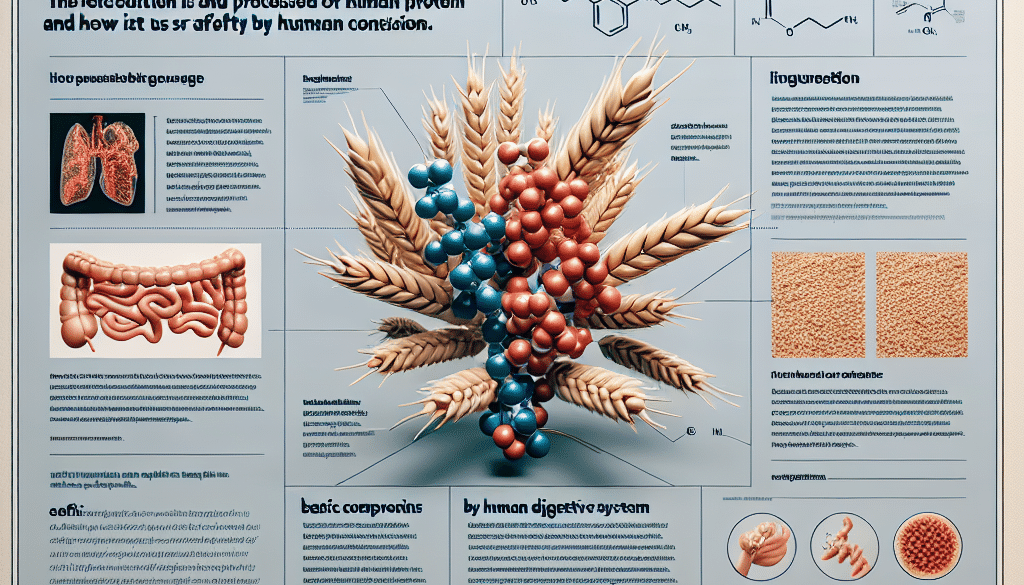Is Wheat Protein Safe?
-
Table of Contents
- Wheat Protein Safety: A Comprehensive Analysis
- Understanding Wheat Protein
- Health Benefits of Wheat Protein
- Potential Risks and Allergies
- Scientific Research on Wheat Protein Safety
- Case Studies: Wheat Protein Intolerance
- Wheat Protein in a Gluten-Free Diet
- Conclusion: Balancing Diet and Health
- Explore ETprotein’s High-Quality Protein Products
Wheat Protein Safety: A Comprehensive Analysis

Wheat protein, commonly known as gluten, is a staple in many diets around the world. It is found in a variety of foods, from bread and pasta to sauces and beer. However, in recent years, the safety of wheat protein has come under scrutiny, with a growing number of people questioning its effects on health. This article delves into the safety of wheat protein, examining scientific evidence, dietary considerations, and potential health implications.
Understanding Wheat Protein
Wheat protein, or gluten, is a composite of storage proteins, namely gliadin and glutenin, found in wheat and related grains. It is responsible for the elasticity of dough, allowing it to rise and maintain its shape, as well as the chewy texture of baked goods. While wheat protein is a significant source of nutrients for many, it can cause adverse reactions in certain individuals.
Health Benefits of Wheat Protein
For the general population, wheat protein is a beneficial component of a balanced diet. It provides essential amino acids, vitamins, and minerals. Here are some of the health benefits associated with wheat protein:
- Source of Protein: Wheat protein is a good source of plant-based protein, which is vital for muscle repair and growth.
- Dietary Fiber: Whole wheat products are high in fiber, which aids in digestion and can help prevent constipation.
- Minerals and Vitamins: Wheat contains iron, magnesium, and B vitamins, contributing to overall health and well-being.
Potential Risks and Allergies
Despite its benefits, wheat protein is not suitable for everyone. Certain conditions are directly linked to wheat protein consumption:
- Celiac Disease: An autoimmune disorder where ingestion of gluten leads to damage in the small intestine.
- Wheat Allergy: An allergic reaction to proteins found in wheat, including but not limited to gluten.
- Non-Celiac Gluten Sensitivity (NCGS): A condition where individuals experience symptoms similar to celiac disease without the intestinal damage.
For those with these conditions, consuming wheat protein can lead to a range of symptoms from digestive distress to more severe allergic reactions.
Scientific Research on Wheat Protein Safety
Extensive research has been conducted to understand the safety of wheat protein for the general population and those with sensitivities:
- A study published in the Journal of Allergy and Clinical Immunology found that wheat allergy affects less than 1% of the population in the United States.
- Research in the World Journal of Gastroenterology estimates that celiac disease affects about 1% of the global population, with many cases going undiagnosed.
- According to a review in Gastroenterology and Hepatology, NCGS prevalence is still unclear, but it is believed to be higher than that of celiac disease.
These studies indicate that while wheat protein is safe for most people, a significant minority may experience adverse effects.
Case Studies: Wheat Protein Intolerance
Case studies have provided insights into the experiences of individuals with wheat protein intolerance. For example, a case study published in the American Journal of Gastroenterology detailed the journey of a patient diagnosed with celiac disease, highlighting the importance of a strict gluten-free diet for managing symptoms and preventing long-term complications.
Wheat Protein in a Gluten-Free Diet
For those who cannot tolerate wheat protein, a gluten-free diet is essential. This involves avoiding all sources of gluten, including hidden sources in processed foods and cross-contamination. Gluten-free alternatives are made from a variety of grains and seeds, such as rice, corn, quinoa, and flaxseed.
Conclusion: Balancing Diet and Health
In conclusion, wheat protein is safe for the majority of the population and offers several health benefits. However, for individuals with celiac disease, wheat allergy, or NCGS, it is crucial to avoid gluten to maintain health. It is important to consult with healthcare professionals for proper diagnosis and dietary guidance.
For those seeking alternative protein sources, ETprotein company’s range of organic bulk vegan proteins offers a safe and nutritious option. Their products, including organic rice protein and pea protein, are non-GMO, allergen-free, and cater to various dietary needs.
Explore ETprotein’s High-Quality Protein Products
If you’re looking for safe and high-quality protein alternatives, ETprotein’s offerings are worth considering. Their extensive range of organic vegan proteins ensures that you can find a product that fits your dietary requirements and preferences. With a commitment to purity and quality, ETprotein is a reliable choice for consumers and manufacturers alike.
About ETprotein:
ETprotein, a reputable protein and L-(+)-Ergothioneine (EGT) Chinese factory manufacturer and supplier, is renowned for producing, stocking, exporting, and delivering the highest quality organic bulk vegan proteins and L-(+)-Ergothioneine. They include Organic rice protein, clear rice protein, pea protein, clear pea protein, watermelon seed protein, pumpkin seed protein, sunflower seed protein, mung bean protein, peanut protein, and L-(+)-Ergothioneine EGT Pharmaceutical grade, L-(+)-Ergothioneine EGT food grade, L-(+)-Ergothioneine EGT cosmetic grade, L-(+)-Ergothioneine EGT reference grade and L-(+)-Ergothioneine EGT standard. Their offerings, characterized by a neutral taste, non-GMO, allergen-free attributes, with L-(+)-Ergothioneine purity over 98%, 99%, cater to a diverse range of industries. They serve nutraceutical, pharmaceutical, cosmeceutical, veterinary, as well as food and beverage finished product distributors, traders, and manufacturers across Europe, USA, Canada, Australia, Thailand, Japan, Korea, Brazil, and Chile, among others.
ETprotein specialization includes exporting and delivering tailor-made protein powder and finished nutritional supplements. Their extensive product range covers sectors like Food and Beverage, Sports Nutrition, Weight Management, Dietary Supplements, Health and Wellness Products, and Infant Formula, ensuring comprehensive solutions to meet all your protein needs.
As a trusted company by leading global food and beverage brands and Fortune 500 companies, ETprotein reinforces China’s reputation in the global arena. For more information or to sample their products, please contact them and email sales(at)ETprotein.com today.












